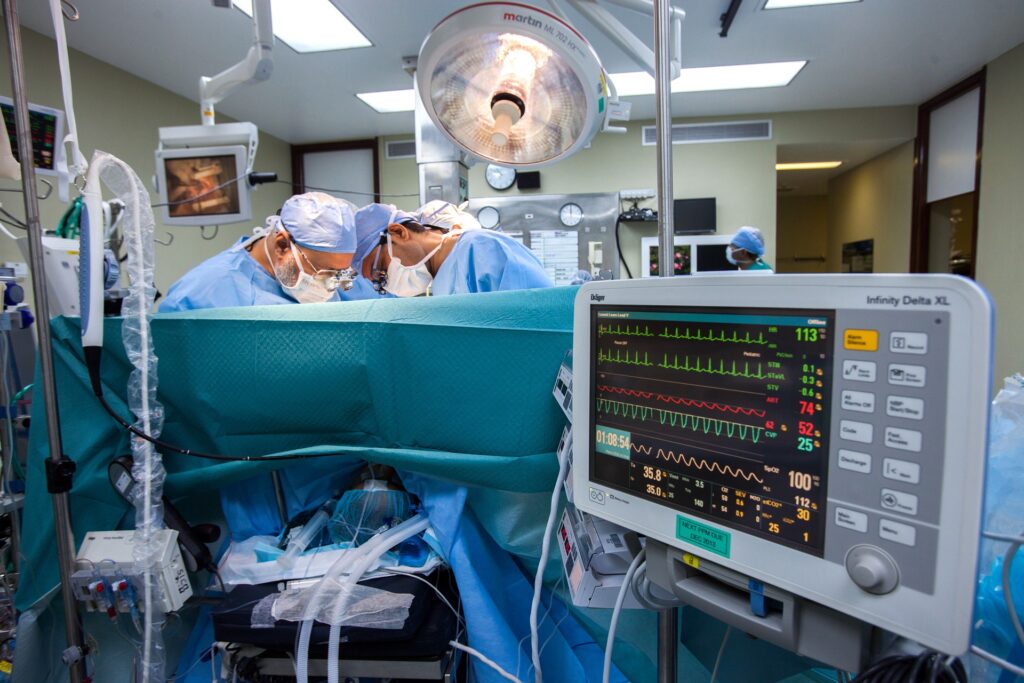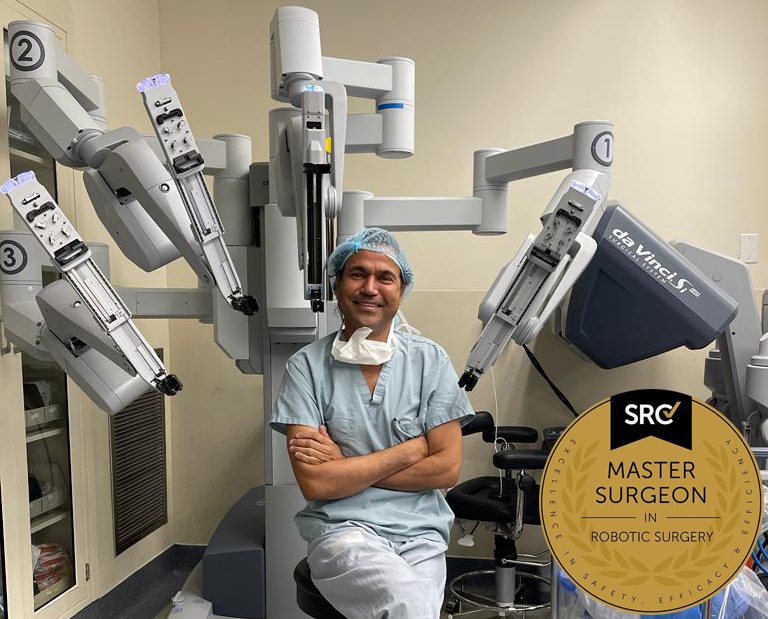When is Endometriosis Surgery Considered an Emergency?
Endometriosis is a medical condition that continues over time, in which tissue resembling the uterus lining is found outside of the uterus. This tissue is often associated with monthly menstrual cycles and is recognized for causing unusually painful and heavy periods, pelvic discomfort, intense cramps, and painful sexual intercourse (dyspareunia).
Endometriosis Surgery is Considered an Emergency in Following Situations:
- Severe Pelvic Pain: If a woman experiences sudden, severe pelvic pain that is unresponsive to pain medication, it could indicate a ruptured endometrioma, a cyst formed by endometrial tissue that has grown outside of the uterus. This is a medical emergency and requires immediate surgical intervention.
- Internal Bleeding: Endometriosis can cause abnormal blood vessel growth, which can lead to internal bleeding. If a woman experiences heavy or prolonged vaginal bleeding or signs of internal bleeding, such as dizziness, weakness, or fainting, she should seek emergency medical attention.
- Bowel or Bladder Obstruction: Endometriosis can cause the growth of abnormal tissue that can obstruct the bowel or bladder. If a woman experiences severe abdominal pain, nausea, vomiting, constipation, or difficulty urinating, she should seek emergency medical attention.
- Infertility: If a woman is experiencing infertility, and endometriosis is suspected as the cause, surgery may be necessary to improve her chances of conceiving. In some cases, surgery may need to be performed urgently if there is evidence of ovarian torsion, which can cause infertility.
Endometriosis with an Acute Colon Obstruction
Endometriosis with an acute colon obstruction is a rare but serious complication of endometriosis. It occurs when endometrial tissue grows on or around the colon and causes a blockage in the bowel. The symptoms of an acute colon obstruction can be severe and include sudden and severe abdominal pain, bloating, nausea, vomiting, and constipation. In some cases, the bowel may become perforated or ruptured, which can lead to infection, sepsis, or even death.
Treatment for endometriosis with an acute colon obstruction usually involves emergency surgery to remove the blockage and any affected tissue. The type of surgery will depend on the severity and location of the obstruction, as well as the individual’s overall health and medical history. In some cases, a partial colectomy (removal of a portion of the colon) may be necessary. After surgery, the individual may require a temporary colostomy (a surgical opening in the abdomen for waste to pass through) to allow the bowel to heal. With prompt treatment, most individuals with endometriosis and an acute colon obstruction can recover fully and resume normal activities. However, long-term management of endometriosis is still necessary to prevent future complications.
Deep Infiltrating Endometriosis (DIE)
Deep infiltrating endometriosis (DIE) is a severe form of endometriosis that can sometimes require emergency medical attention. This occurs when the endometrial tissue grows deep into the tissue surrounding the uterus, such as the bladder, bowel, or rectum, causing significant pain and other symptoms.
In some cases, DIE can lead to complications such as severe bleeding, bowel obstruction, or perforation, which require immediate medical attention. For example, if the endometrial tissue has grown into the bowel or rectum, it can cause a blockage or perforation, leading to abdominal pain, fever, and sepsis. Similarly, if the endometrial tissue has grown into the bladder, it can cause urinary retention, which can lead to kidney damage if left untreated.
Therefore, if a woman with deep infiltrating endometriosis experiences severe symptoms, such as intense abdominal pain, fever, or difficulty passing urine or stool, she should seek medical attention immediately. Depending on the severity of the symptoms, emergency surgery may be required to address the underlying issue and prevent further complications.

Surgery is Not the First Choice of Treatment for Endometriosis
Surgery is not typically the first choice of treatment for endometriosis because it is a complex and invasive procedure that carries risks and potential complications. Additionally, endometriosis is a chronic condition that often requires long-term management, and surgery alone may not provide a permanent solution.
Instead, medical treatments such as pain relief medications, hormonal therapies, and lifestyle modifications are often recommended as the first-line treatment for endometriosis. These treatments can help to manage symptoms, slow the growth of endometrial tissue, and improve a woman’s quality of life without the need for surgery.
Moreover, surgery for endometriosis is not always successful in removing all the endometrial tissue, and in some cases, it can lead to the formation of scar tissue or adhesions, which can cause further complications and pain. Therefore, surgery is typically reserved for cases where other treatments have been unsuccessful or when there are specific indications, such as infertility or large endometrial cysts. Ultimately, the decision to pursue surgery for endometriosis should be made in consultation with a healthcare provider, based on the individual’s unique circumstances and needs.
Surgical Intervention may be Recommended for the Treatment of Endometriosis in the Following Situations:
- Severe Symptoms: If a woman experiences severe pain, heavy bleeding, or other debilitating symptoms that significantly affect her quality of life and do not respond to medical treatments, surgery may be necessary to remove the endometrial tissue causing the symptoms.
- Fertility Issues: Endometriosis can sometimes cause infertility, and surgery may be necessary to improve a woman’s chances of conceiving. For example, surgery may be recommended to remove endometrial cysts or to repair damage to the fallopian tubes.
- Endometriomas: Endometriomas are cysts that form when endometrial tissue grows within the ovaries. If these cysts are large or causing significant symptoms, surgery may be necessary to remove them.
- Suspected Cancer: In rare cases, endometrial tissue outside the uterus may develop into a type of cancer called endometrioid adenocarcinoma. If a doctor suspects that a woman has this type of cancer, surgery may be necessary to remove the affected tissue.
It is important to note that surgery is typically not the first-line treatment for endometriosis and should only be considered after other treatment options have been tried and found to be ineffective. Additionally, surgery may not be appropriate or necessary for all women with endometriosis.
Latest Posts
- New York Gynecology Endometriosis
- Contact Info:
-
375 E. Main Street,
Suite 7A, Bay Shore,
NY 11706 - (631) 533-9733
Pankaj Singhal, MD, MS, MHCM
Master Surgeon in Robotic Surgery
Dr. Pankaj Singhal, a globally recognized endometriosis surgeon, possesses over 25 years of expertise in laparoscopic excision surgery, enabling him to tackle even the most challenging endometriosis cases with confidence. Dr. Pankaj treats patients with diverse endometriosis-related conditions, ranging from ovarian endometriomas to severe deep infiltrating endometriosis that affects the bowels and other organs.
Dr. Pankaj prioritizes minimally invasive surgery and provides comprehensive personal care. Additionally, he is the owner and founder of New York Gynecology and Endometriosis (NYGE), and has dedicated his life to advocating for, respecting, and treating women suffering from this little-known disease. He is one of the few surgeons in the entire United States who have completed over 5,718 robot-assisted gynecologic surgeries.

We Accept Most Major Insurance Plans
Convenient Billing Options for Comprehensive Coverage.
Surgeries are typically covered by health insurance. However, the extent of coverage can vary depending on the specific insurance plan and policy. Some insurance plans may cover a broad range of surgical procedures, including both elective and necessary surgeries, while others may have limitations or exclusions for certain procedures.
In some cases, certain insurance plans or programs may fully cover the cost of surgery, leaving the patient with no financial responsibility.
Request an Appointment with
New York Gynecology Endometriosis
"*" indicates required fields
